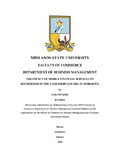Please use this identifier to cite or link to this item:
https://cris.library.msu.ac.zw//handle/11408/3889| Title: | The impact of mobile financial services on households in the cash shortage era in Zimbabwe | Authors: | Benjere, Loki | Keywords: | mobile financial services cash shortage households |
Issue Date: | 2018 | Publisher: | Midlands State University | Abstract: | The study focused on the effect of mobile financial services on households in a cash strapped society. This research was prompted by the increase in usage of mobile money services due to increasing mobile penetration and internet usage in the Zimbabwean society. It was expected that with increase in use of mobile phones would assist in reducing the need for cash by integrating mobile phone usage and mobile money transfer as the country is experiencing liquidity challenges. Evidence in the body of literature points to the possibility of reducing the need for handling cash in a community which has embraced mobile money transfers. On the contrary, despite increasing mobile phone usage in Zimbabwe and the rise of mobile financial services, there persist increasing outcry over cash shortages. This study adopted a descriptive survey research design in order to investigate the extent to which mobile financial services have eased the problems associated with cash shortage.This research was conducted through a survey where pre-coded structured questionnaires were administered to users of Ecocash, OneMoney and Telecash platforms. The questionnaires were pilot tested with 20 users selected Dzivaresekwa 2 High School. Out of the 150 issued questionnaires, 124 questionnaires representing 82.6 % of the total questionnaires distributed were returned fully completed, while 26 questionnaires were not returned representing 17.4 % of the total number of respondents.These questionnaires were eventually used for further data analysis and presentation of results upon which this study is based on. The significance level is 0.001<0.05 which shows that model is valid because p-value is less than 0.05. As such, the regression model was a good fit for the current data. The study found out that mobile financial services frequently used pertained to mobile money transfer, followed by mobile banking and mobile finance. Also, on the factors hindering the uptake of mobile financial services in Zimbabwe, macroeconomic factors like inflation and economic output were the major driver of factors hindering the uptake of mobile financial services. The inability of using mobile money to procure from outside the country has result in the demand for cash as people and businesses require cash to import goods from other countries. ese influenced the actions and reactions of mobile money operators and the individual users of mobile financial services.The regression results obtained revealed that mobile financial services have had a moderate impact on the need for cash in Zimbabwe. Amongst the available mobile financial services, only mobile payments had a positive impact on the need for cash. It was recommended that the government should develop and implement policy frameworks which encourage the usage of mobile money. Also, there should be measures to avoid rating of mobile money against physical cash. This enables physical cash to be considered at par with mobile money and this increases its usage. | URI: | http://hdl.handle.net/11408/3889 |
| Appears in Collections: | Master Of Commerce In Strategic Management And Corporate Governance Degree |
Files in This Item:
| File | Description | Size | Format | |
|---|---|---|---|---|
| Benjere .pdf | Full Text | 880.36 kB | Adobe PDF |  View/Open |
Page view(s)
352
checked on Feb 11, 2026
Download(s)
370
checked on Feb 11, 2026
Google ScholarTM
Check
Items in MSUIR are protected by copyright, with all rights reserved, unless otherwise indicated.



